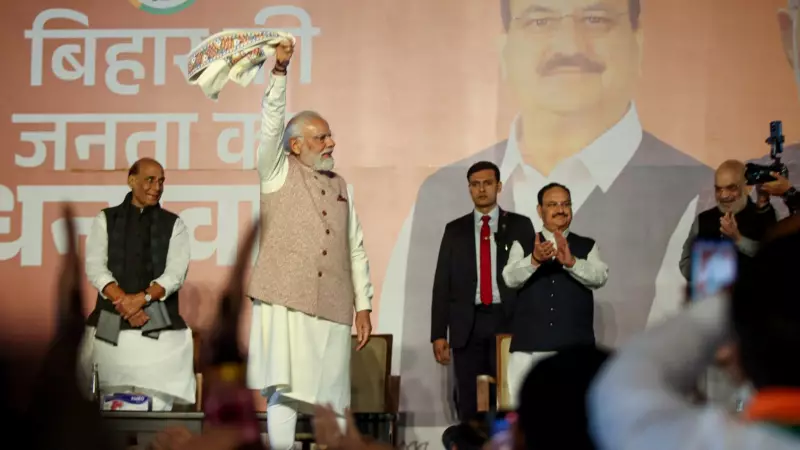
In a historic political earthquake, Bihar's ruling NDA coalition has secured a massive victory in the state assembly elections, reducing the opposition Mahagathbandhan to its smallest size in 15 years. The coalition, led by Chief Minister Nitish Kumar, crossed the 200-seat mark in the 243-member assembly, setting the stage for Kumar's remarkable tenth term in office.
Opposition Crushed in Landslide Defeat
The Mahagathbandhan, comprising the RJD, Congress and three Left parties, faced what political analysts are calling a crushing defeat. Until late counting hours on Friday, their combined tally was hovering around a mere 35 seats, representing the smallest opposition presence in the Bihar assembly since 2010. This dramatic reduction in opposition space marks a significant political realignment in one of India's most crucial states.
The scale of victory for the NDA appeared similar to the 2010 mandate when the JD(U)-BJP alliance secured 206 seats and Nitish Kumar began his third term as chief minister. This time, however, the victory carries additional significance as it strengthens the BJP's position at the center ahead of crucial state elections scheduled for next year.
PM Modi Hails "Prachand Jeet" and Looks Toward Bengal
Prime Minister Narendra Modi, addressing jubilant BJP workers at the party headquarters in New Delhi, described the outcome as a "prachand jeet" (massive victory) for development and progress. In his victory speech, the Prime Minister invoked "Chhathi Maiya" and declared that Bihar had decisively rejected what he called the "communal MY formula" of the "jungle raj" party - a clear reference to the RJD and its Muslim-Yadav core voter base.
Modi characterized the verdict as "a victory for democracy" and "victory of good governance, development, public welfare and social justice." He pledged to work with renewed energy for Bihar's progress and sent a strong message to West Bengal, where elections are due next year.
"Gangaji Bihar se behati hui, Bangal tak pahunchti hai. Bihar ne Bangal mai BJP ki vijay ka raasta bhi bana diya hai", Modi declared, drawing a direct connection between the Bihar victory and the BJP's prospects in West Bengal. He assured the people of Bengal that the BJP would, with their support, uproot what he described as "jungle raj" from the eastern state.
Nitish Kumar Credits Alliance Unity and Voters
In his first remarks following the decisive victory, Chief Minister-elect Nitish Kumar emphasized the "complete unity" among NDA partners and expressed profound gratitude to the voters of Bihar. In a post on social media platform X, Kumar stated: "People of the state have expressed their confidence in our government by giving us a massive mandate in the polls. For this, I bow to all the esteemed voters of the state, and express my heartfelt gratitude and thanks."
Kumar specifically thanked Prime Minister Modi for his support and acknowledged all NDA alliance partners - Chirag Paswan of LJP (Ram Vilas), Jitan Ram Manjhi, and Upendra Kushwaha. He expressed confidence that Bihar would progress even further and eventually join the ranks of India's most developed states.
Chirag Paswan, one of the key NDA allies, confirmed that Nitish Kumar would continue as chief minister and attributed the opposition's "humiliating loss" to their "arrogance." Paswan stated that the people's faith in NDA unity was the primary reason for their convincing victory.
Vote Share Analysis Reveals Dramatic Shift
The electoral statistics reveal a dramatic shift in voter preferences compared to the 2020 assembly elections. The NDA secured an impressive 46.52% vote share, significantly ahead of the Mahagathbandhan's 37.64%. Within the ruling coalition, the BJP led with 20.08% vote share, closely followed by JD(U) at 19.26%, LJP (RV) at 4.97%, HAM (S) at 1.18%, and RLM at 1.03%.
For the opposition alliance, the RJD managed 23% vote share, Congress 8.71%, Left parties 4.18%, with smaller parties contributing the remainder. This represents a notable reversal from the 2020 elections when the Mahagathbandhan had marginally edged out the NDA with 38.75% versus 37.26% vote share.
The results indicate that voters have once again reposed trust in Nitish Kumar's governance model, which combines various welfare schemes and direct benefit transfers. Despite concerns about voter weariness and questions regarding his political alignments, Kumar has demonstrated remarkable resilience and political acumen.
Future Alliance Dynamics and Governance Challenges
Political observers suggest that the dynamics within the NDA could undergo changes following this decisive victory. The BJP, having emerged as the senior partner with greater influence on junior allies than the JD(U), might assert itself more strongly in policy decisions, bureaucratic appointments, and portfolio allocations.
However, the JD(U)'s importance as an ally at the Centre with 12 MPs might prevent any radical power shifts. JD(U) sources indicate that party leaders Rajiv Ranjan Singh and Sanjay Kumar Jha will need to ensure balance in the coalition arrangement.
A BJP leader downplayed concerns about potential friction, recalling that in 2010, Nitish Kumar had secured 115 seats - just seven short of majority - but had chosen not to dump the BJP. The leader emphasized that Kumar would definitely continue as chief minister, signaling continuity in the alliance's leadership.
The massive mandate presents both an opportunity and challenge for the NDA government as it begins its new term with heightened expectations from voters who have overwhelmingly endorsed its development agenda and governance model.






